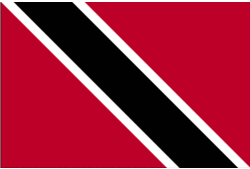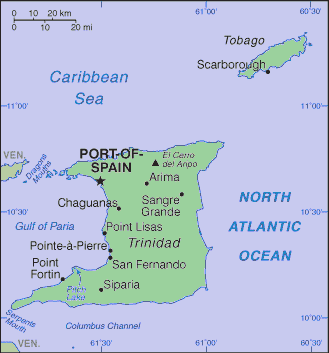Traveling Luck for Trinidad and Tobago. Trinidad and Tobago, North America
Trinidad and Tobago is located in Caribbean, islands between the Caribbean Sea and the North Atlantic Ocean, northeast of Venezuela.
Land in Trinidad and Tobago is mostly plains with some hills and low mountains.
Trinidadian, Tobagonian land covers an area of 5128 square kilometers which is slightly smaller than Delaware
 Trinidadian, Tobagonian national flag (Flag of Trinidad and Tobago)
Trinidadian, Tobagonian national flag (Flag of Trinidad and Tobago)
As for the Trinidadian, Tobagonian climate; tropical; rainy season (June to December).
Trinidadian(s), Tobagonian(s) speak English (official), Hindi, French, Spanish, Chinese.
Places of note in Trinidad and Tobago
 Trinidadian, Tobagonian map
Trinidadian, Tobagonian map
Regions of Trinidad and Tobago
The islands came under British control in the 19th century; independence was granted in 1962. The country is one of the most prosperous in the Caribbean thanks largely to petroleum and natural gas production and processing. Tourism, mostly in Tobago, is targeted for expansion and is growing.
Trinidad and Tobago, the leading Caribbean producer of oil and gas, has earned a reputation as an excellent investment site for international businesses. Tourism is a growing sector, although not proportionately as important as in many other Caribbean islands. The economy benefits from low inflation and a growing trade surplus. Prospects for growth in 2006 are good as prices for oil, petrochemicals, and liquefied natural gas are expected to remain high, and foreign direct investment continues to grow to support expanded capacity in the energy sector. The government is coping with a rise in violent crime.
Trinidadian, Tobagonian natural resources include petroleum, natural gas, asphalt
Pitch Lake, on Trinidad's southwestern coast, is the world's largest natural reservoir of asphalt
Trinidadian, Tobagonian religion is Roman Catholic 26%, Hindu 22.5%, Anglican 7.8%, Baptist 7.2%, Pentecostal 6.8%, other Christian 5.8%, Muslim 5.8%, Seventh Day Adventist 4%, other 10.8%, unspecified 1.4%, none 1.9% (2000 census).
Natural hazards in Trinidad and Tobago include outside usual path of hurricanes and other tropical storms.
Travel Advice for Trinidad and Tobago
Trinidad and TobagoSUMMARY
- You should be aware of the global risk of indiscriminate terrorist attacks which could take place in public areas, including those frequented by foreigners. There were five separate bombings in Port of Spain between July and October 2005, in which a number of people were injured. Police are continuing their investigations into what looks to have been a series of domestically-motivated actions.
- You should be aware that there are increasing levels of violent crime, especially shootings and kidnappings. British nationals have been victims of violent attacks, particularly in Tobago where law enforcement is weak. Extreme caution is advised if renting villas in the south west, and at villas throughout the island you should ensure that adequate security measures are in place.
- Most of our consular assistance in Trinidad and Tobago is directed towards victims of crime and those in prison on drugs charges.
- If you are travelling to Trinidad and Tobago for the ICC Cricket World Cup, which runs from 11 March to 28 April 2007, with warm-up games in the region beginning on 5 March 2007, you should see ICC Cricket World Cup 2007 for general advice you may need before you travel.
- We strongly recommend that you obtain comprehensive travel and medical insurance before travelling. You should check any exclusions, and that your policy covers you for the activities you want to undertake. Please see: Travel Insurance
SAFETY AND SECURITY
Crime
LOCAL LAWS AND CUSTOMS
Trinidad and Tobago has a number of laws, which make certain homosexual acts illegal.
ENTRY REQUIREMENTS
HEALTH
In some areas, medical facilities can be limited and may not be up to UK standards. Private clinics are able to treat most ordinary problems, but there may be a need for medevac to Miami or elsewhere in cases of serious accident or illness. You should check that your insurance covers this.
There is a very high prevalence of the HIV/AIDS virus in all the Caribbean islands, including Trinidad and Tobago. You should take precautions to avoid exposure to it.
Dengue fever has become a problem in recent years particularly in the wet season – May to December. Dengue Haemorrhagic Fever is on the increase. You can minimise exposure to mosquito bites by using repellents.
You should seek medical advice before travelling and ensure that all appropriate vaccinations are up-to-date. For further information on health, check the Department of Health’s website at: www.dh.gov.uk.
GENERAL
OTHER

 Search
Search Trinidad and Tobago country profile
Trinidad and Tobago country profile Travel advice for Trinidad and Tobago
Travel advice for Trinidad and Tobago